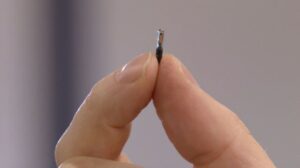The advantages and convenience of the COVID-19 vaccine passport microchip implant have been discussed in a number of papers. However, because it makes use of NFC technology, it raises privacy issues about tracking users’ whereabouts.
In addition to this, this chip will cost at least $180, and maybe as little as $100, depending on the configuration.

Is it possible for the COVID-19 Vaccine Passport Microchip Implant to track your whereabouts?
According to Fox Business, the Swedish inventor of the COVID-19 vaccine passport microchip implanted under the skin has addressed privacy concerns about storing sensitive information in such an easily accessible manner.
The microchip implant developed by the tech company DSruptive Subdermals is approximately 2 millimeters by 16 millimeters in size and can be scanned to reveal a person’s immunization history.
The technology is known as near-field communications (NFC), which is the same as that used to enable contactless payments, is utilized in the implants to provide them with a wide range of uses.
DSruptive is a high-tech business that specializes in implanted microelectronics and other forms of implantable technology.
The company claims to have a long history in the microchip implant sector, with expertise in technology, business, service design, communications, and medical aspects of subdermal implants.
Read More: Student Debt Cancellation is Insult to Millions of Americans. Here’s Why?
The company claims to have expertise in technology, business, service design, communications, and medical aspects of subdermal implants.
Hannes Sjoblad, the managing director of DSruptive Subdermals, told AFP that the company’s mission is to develop “disruptive subdermals.” “Our knowledge of NFC allows us to communicate with those who live in the world of connected gadgets or the Internet of things as they are frequently known to.
The fact that I hold the chip in my hand allows me to communicate with all of these devices and engage with them without a problem “according to Fox Business.
Furthermore, another user may utilize NFC tags to obtain the information, but they would need to do so with a smartphone and bring it close enough to the implant to activate the chip and obtain the information.
At the same time, Go Codes highlighted that near-field communication (NFC) asset tagging is based on the principles of radio-frequency identification. A signal transmitter and a signal receiver are the components of the system.
NFC tags transmit passive data, but they are unable to process it. Alternatively, they may transmit information by drawing electricity from readers, a technique that is also employed by Apple Pay.
In addition to NFC tags, these can also be used to track products within a retail establishment. When employed as an anti-theft solution in a brick-and-mortar retail establishment, the device watches the transit of objects via the exit.
If it detects the presence of a shoplifted item, it will raise the alarm.
Despite the benefits that microchip implants provide, the technology that is employed to implant them continues to create privacy issues for everyone.
In this regard, Sjoblad highlighted that the COVID-19 vaccine passport microchip implant is not capable of transmitting or receiving a person’s location information.
“Because they lack a battery and are unable to emit a signal on their own, they are considered passive. They’re dozing off in their seats “Sjoblad went on to say more.
The cost of the COVID-19 vaccine microchip implant.
According to NPR, over 4,000 Swedes have selected similar chip implants in the last five years. These implants can hold a variety of information, including business cards, public transportation cards, and even automobile key fobs, according to the station.
Furthermore, according to prior reports, the chips, which are roughly the size of a grain of rice, are implanted into the skin slightly above the thumb with a syringe that looks similar to those used for vaccinations and is inserted into the skin slightly above the thumb.
Additionally, the therapy will cost at least $180, and it may be as little as $100 depending on the provider.
“Buying the more modern versions of a chip implant costs one hundred Euros ($113), which is comparable to the cost of a health wearable that will likely cost twice as much but can be used for 20, 30, or 40 years, as well as the cost of an implant that will last for decades.
In contrast to a wearable that can only be used for three or four years, a computer can be used for a lifetime “Sjobal’s description.
Read More: 5 ways the super-rich organize to pay lower taxes
Fortunately, this microchip implant is completely reversible, which means that it can be removed at any time without any consequences.
Additionally, the managing director claimed that the Covid pass is the only example of a conceivable usage and that it will be “a thing for the winter of 2021-2022,” according to RTE News.

